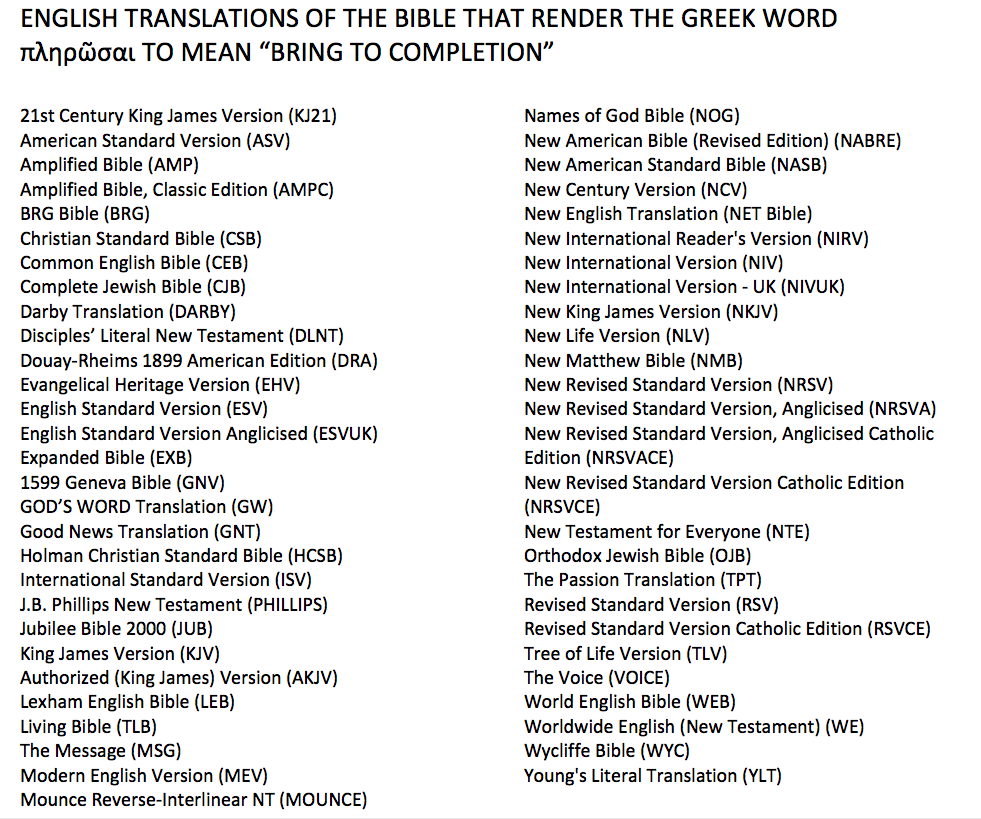
Zach & The Law (Pt. 1)
In my ongoing mission to learn what Torahism is all about and test it against Scripture, I’ve had another Zach Bauer video shared with me. In this video, our winsome host is answering a question he received from a viewer about Jesus’ fulfillment of the covenant and the notion that the moralistic laws are still to be followed and the ritualistic laws are not.
Bauer covers two main topics in the video above: the correct interpretation of a specific word, and the existence of
The main verse Bauer focuses on as he answers his viewer’s question comes from the book of Matthew: “Think not that I am come to destroy the law or the prophets: I am not come to destroy, but to
Bauer begins by correcting what he says are a couple of misconceptions, starting with the interpretation of the word fulfill in the verse above. He claims that in the Christian church today, the word fulfill, as used in this verse, is typically taught to mean “do away with” or “abolish”. (NOTE: As a member of the Christian church I’ve not personally heard that taught before, but I’m willing to grant that some churches may endorse that false notion.) Bauer argues that the word
Bauer then goes on to claim that the word fulfill in this verse actually means to do. “To do something is to fulfill it”, he says. He then spends several minutes laboring the point that

* Note the primary definition of “fulfill” displayed in the tab is “bring to completion”.
Bauer further claims that “Every single time you see the word fulfill you can replace it with the word do.” And he provides the following verses in which he argues one could replace the word fulfill with the word do without losing the
And this is where the wheels fall off Bauer’s exegesis.
What’s In A Word?

By now you might be asking yourself, why is Bauer spending so much time arguing about the interpretation of one word in a Bible verse? Well, it becomes evident a little later in this video that he needs to adjust the meaning of the word fulfill in Matt 5:17 so that he can maintain his belief that we are still under the Law of Moses (what he calls the Torah). Because if we were to interpret the word
But Bauer believes otherwise. We see this in the final answer he gives to his viewer near the end of the video. He says, “Here’s the answer to your question, David. All of the law, all of the Torah is still valid.” Thus, he needs to argue for an interpretation of Matthew 5:17 in which Jesus does not say He came to complete the Law, but rather He simply came to do the Law.
That Word

For someone promoting the replacement of a word in Scripture, Bauer displays a shocking lack of knowledge about exegesis and hermeneutics. He actually suggests that every single time you see the word fulfill in the Bible you can replace it with the word
Any textual scholar (biblical or otherwise) will tell you that each separate use of a word needs to be considered within the specific context it was written. That’s Hermeneutics 101. And this is especially true when you consider that the Bible is a complex and sacred historical document that wasn’t even written in English! Indiscriminately swapping out synonyms for English words in Scripture is a surefire recipe for cooking up a false theology.
And there is a larger matter to keep in mind when developing an accurate theology; we not only need to make sure we’re interpreting each verse accurately, we also need to look at that verse in the context of the full passage (i.e. the complete thought) in which its found. Further, we need to view it as part of the book in which it’s written, considering things like Who wrote it? Who was the audience? Why was it written? What genre is it? When was it written? Where was it written? etc. And ultimately every verse needs to be interpreted in light of the entire Bible; it needs to harmonize with the teaching and meaning found in the whole of Scripture. So ideally we would want to interpret Jesus’ words in Matthew 5:17 in light of His entire body of teaching in the New Testament, as well as the entirety of Scripture. But it turns out that in this case, we don’t even need to go that far before we stumble across Bauer’s fatal error.
To properly understand the intended meaning of a Bible verse we start by looking at it in its original language. The book of Matthew was written in Greek. I looked up Matthew 5:17 in a Greek lexicon and it turns out that the phrase “but to fulfill” was originally written as πληρῶσαι (plērōsai), which means “to make full, to complete.” It comes from the root word πλήρης (plérés) which means “full, abounding in, complete, completely occupied with”. So the original Greek here clearly should not be translated to simply mean “do”.
I decided to check my work against the body of scholarly knowledge that has been around for thousands of years. I personally reviewed Matthew 5:17 in all 55 translations of the Bible listed below and found that every one of them translated the Greek word plērōsai to mean “bring to completion”, not “do”. Most translations below use the words fulfill or complete, though a handful of them use other phrases that mean the same thing, such as, “bring about what they said”, “make them come true”, or “accomplish their purpose”.

The one version I found that uses the word do was the Worldwide English (WE) translation, which renders Matthew 5:17 as, “Do not think that I have come to take away the law and the writings of the prophets. No, I have not come to take them away. But I have come to do what they say must be done.” So even this translation carries the idea that Jesus came to satisfy or complete the Law, rather than simply perform it.
In Summary: Both?
As I read this passage in Matthew—in light of the cumulative story of the Bible as a whole—Jesus is teaching us that he both came to obey the Law and that He came to bring it to completion. Because if Yeshua said He came to obey the Law and do what it requires, it begs the question: what did the Law require?
The answer is that it required a perfect sacrifice for sin; the shedding of the blood of an unblemished offering sufficient to satisfy God’s justice. In Hebrews 10 we see that the blood of animals could never atone for sin. The sacrifices required under the Torah were merely a reminder of sin, a display of faith to which Israel was called. The fact that they were continually repeated tells us that the ultimate that sacrifice had yet to be offered (Heb 10:1-3). The repetition was a reminder that Israel was still looking forward to the ultimate sacrifice, once for all (Heb 10:10).
It’s not the blood of animals, but Yeshua’s blood that atones. And that’s exactly what He provided. His sacrifice on the cross fulfilled what the Torah was pointing toward, and at the same time it rendered the Mosaic Covenant—and with it, the law of Moses—obsolete (Heb 8:13, 10:18).
In this video, Bauer is asking us to dismiss 2,000 years of biblical scholarship—including countless highly-educated translators who read and spoke Greek fluently and all agree with one another about the translation—and instead believe an unsubstantiated interpretation based on the fact that the English word do can be a synonym for the English word fulfill. And more than that, he’s ignoring the context of what the Law required as he tries to interpret this passage in Matthew.
At best, this is irresponsible exegesis. (And I’m willing to give Bauer the benefit of the doubt and assume he is a good man who loves God but has just veered of course.) At worst, this is an insidious twisting of Holy Scripture. In either case, its a false teaching that could ultimately lead people away from salvation. And that’s why I feel such a burden to challenge Torahism.
A Personal Note
As I write these articles on Torahism and challenge that theology I want to emphasize that I am not fighting against people, but against ideas. And I am learning a lot along the way. Not just about Torahism, but also about what I believe and why. Where the Torahists get it right (and by right I mean
When I hear or read something from a
